 Weird Stuff
Weird Stuff  Weird Stuff
Weird Stuff  Miscellaneous
Miscellaneous 10 LEGO Facts That Will Toy with Your Mind
 Misconceptions
Misconceptions 10 Widespread Historical Myths and the Texts That Started Them
 Crime
Crime 10 Incredible Big-Time Art Fraudsters
 Movies and TV
Movies and TV 10 Most Influential Fictional Objects in Cinema History
 Our World
Our World Top 10 Real Almost‑Cities That Never Materialized
 Technology
Technology 10 Unsettling Ways Big Brother Is (Likely) Spying on You
 Music
Music 10 Chance Encounters That Formed Legendary Bands
 Space
Space 10 Asteroids That Sneaked Closer Than Our Satellites
 Sport
Sport The 10 Least Credible Superstars in Professional Sports
 Weird Stuff
Weird Stuff 10 of History’s Greatest Pranks & Hoaxes
 Miscellaneous
Miscellaneous 10 LEGO Facts That Will Toy with Your Mind
 Misconceptions
Misconceptions 10 Widespread Historical Myths and the Texts That Started Them
Who's Behind Listverse?

Jamie Frater
Head Editor
Jamie founded Listverse due to an insatiable desire to share fascinating, obscure, and bizarre facts. He has been a guest speaker on numerous national radio and television stations and is a five time published author.
More About Us Crime
Crime 10 Incredible Big-Time Art Fraudsters
 Movies and TV
Movies and TV 10 Most Influential Fictional Objects in Cinema History
 Our World
Our World Top 10 Real Almost‑Cities That Never Materialized
 Technology
Technology 10 Unsettling Ways Big Brother Is (Likely) Spying on You
 Music
Music 10 Chance Encounters That Formed Legendary Bands
 Space
Space 10 Asteroids That Sneaked Closer Than Our Satellites
 Sport
Sport The 10 Least Credible Superstars in Professional Sports
10 Times The Butler Actually Did It
Mr. Black is dead, and his killer was not Miss Scarlet or Professor Plumb. It was the butler, in the conservatory, with a lead pipe! Though the butler is not one of the original suspects in Clue, there are many other fictional settings in which the butler is the one who committed the crime. Arthur Conan Doyle wrote about a butler who attempted to rob his employers and ended up dead in The Adventure of the Musgrave Ritual. Herbert Jenkins’s The Strange Case of Mr. Challoner has the butler as the main villain.
However, by 1928, art critic and mystery novelist S.S. Van Dine had written the Twenty Rules For Writing Detective Stories. The eleventh rule in the list suggests that the culprit should not be a servant, that they are too obvious a choice for the author to pick. There are several writers who have broken the rule since its establishment. Yet, our focus here is on the ten butlers, valets, and maids who did not get the memo.
10Mary Roberts Rinehart

Mary Roberts Rinehart was an American mystery novelist. She was also the author most often credited for coining the phrase “The Butler Did It.” Yet, her 1930s novel The Door, never used that specific phrase when pinning the crime on the butler. The story of Rinehart’s criminal butlers does not end in her fiction, however.
After traveling to Belgium to be a correspondent during World War I, Mary continued her prolific writing career in her home in Bar Harbor, Maine. Then, in 1947, there was a grand plot twist in her life, as though right out of one of her own novels.
After hiring a butler, rather than promoting Reyes, a chef who had been with her for 25 years, the Filipino man became enraged. He walked up to her while she was reading and pulled a gun on her. He shot at her point blank. Lucky for Mary, the gun misfired! With the help of her other servants, they managed to subdue Reyes, and Mary’s life returned to its calm coastal life. For Mary, it was not the butler who did it; it was the chef.
9Charlie Jones

Charles F. Jones worked as a valet for William Marsh Rice, founder of Rice University in Houston, Texas. Upon Rice’s death, the University received over $8,000,000, which was most of Rice’s entire self-made fortune. Though we have a well to do millionaire and his personal valet, this story is not one of Bruce Wayne and Alfred Pennyworth. Instead, Jones betrayed his employer and collaborated with an unscrupulous lawyer Albert T. Patrick.
Patrick, knowing Mr. Rice from a dispute over the will of Mrs. Rice, saw the opportunity to take advantage of the wealthy widower. Together he and Jones created dozens of fake documents including a will. They even devised a document declaring Rice’s desire for cremation and hatred for embalming. Then, Jones claims, he poisoned his employer with chloroform.
The murder happened on a Sunday, and they would have to wait 24 hours for the crematorium to heat to operating temperature. In the meantime, Patrick agreed to have Rice embalmed to keep him from decomposing. Patrick then attempted to cash several checks in Rice’s name. Both men were soon arrested, and the cremation was put on hold, with the evidence well preserved. During Patrick’s murder trial, Charlie Jones made many conflicting statements and confessions. Even so, he was never convicted or even tried for the murder of his employer.
8Kate Webster
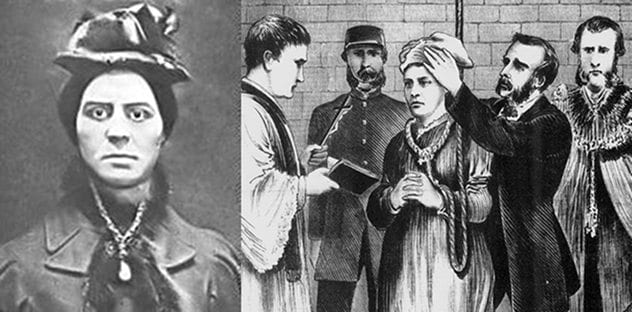
Catherine Webster (Kate) was a career criminal, but she was not a very good one. In and out of jail her entire life, even having children did not settle the woman. In 1879, she took a job as a maid for the elderly Julia Martha Thomas. Within a month it proved she was no better as a maid than as a thief, and she was fired. Kate did not take this well, and she murdered Mrs. Thomas in a fit of rage; pushing her down the stairs and strangling her.
Some stories report that Kate went to bed after that, others suggest she went to the local pub. All accounts agree that once she returned to the corpse, she cut up her deceased employer with a razor and a meat saw. She put the more manageable pieces into a pot of water. While they boiled, she used the time to clean the blood off the floor. Then she disposed of the boiled flesh over a bridge, fed the fat drippings to the local kids, and quickly sold the furniture in the house. The next day a box of the boiled flesh was found, but Kate had already fled. She was soon caught in Ireland and confessed the whole crime to a priest before she was hung. The only thing she never revealed was the location of Mrs. Thomas’s head, which was finally recovered in 2011, found buried in English naturalist Sir David Attenborough’s garden.
7Paolo Gabriele

Pope Benedict’s personal butler did it! He did not kill anyone, that we know of. However, he has been charged with betraying the Pope and the Vatican, resulting in an 18-month prison sentence. News reports from 2012 indicate that Paolo Gabriele, who had more access to the Pope than most anyone else, took advantage of the situation.
Under the nose of the Pope and others who worked alongside Gabriele, the man photocopied over 1,000 personal documents. This resulted in a large VatiLeaks scandal. Gabriele even managed to pass on copies of important and personal documents to an Italian journalist. Gianluigi Nuzzi published this information in his book His Holiness: The Secret Papers of Benedict XVI. Though Gabriele was tried, convicted, and imprisoned, the Pope gave him an early pardon, and he has returned to live with his family and seek work. Preferably not as a double-crossing butler this time.
6François Benjamin Courvoisier
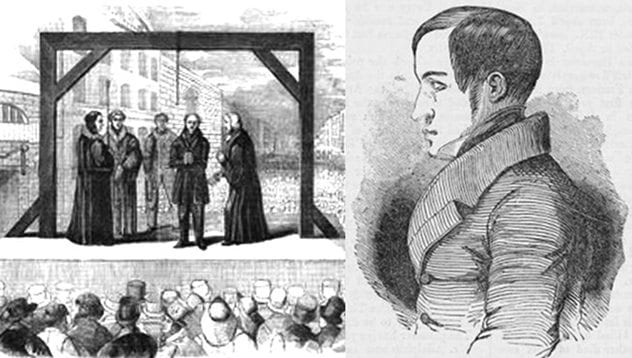
In May of 1840, Lord William Russell was killed in his sleep, in his own bedroom, with his own kitchen knife. Arrested for the murder was his valet, François Benjamin Courvoisier. In the course of his trial, Courvoisier admitted that Lord Russell had caught him stealing. Russell told Courvoisier that he would be dismissed the next morning.
At the loss of his job and his honor, Courvoisier fell into a frenzy. He waited until Lord Russell was asleep, grabbed a carving knife from the kitchen, and went upstairs to his master’s bedroom. Then he slit the man’s throat. He was soon found guilty of his crimes.
Both Charles Dickens and William Makepeace Thackeray were in attendance for Courvoisier’s execution. The latter wrote and published his essay on the event titled Going To See A Hanged Man which expresses his distress and disgust over the proceedings.
5The Papin Sisters
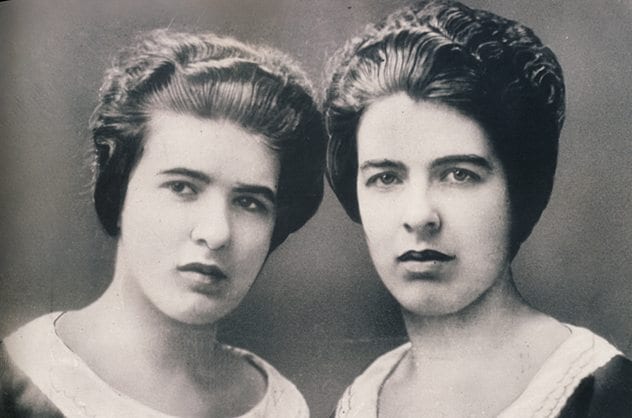
They say it is always the quiet ones. When it came to Christine and Lea Papin, this saying holds true. Throughout their trial, the Papin sisters were docile, their words monosyllabic and near inaudible. Their neighbors and employers never suspected the two maids to have a violent bone in their bodies. They were wrong.
In the afternoon of February 2, 1933, the sisters attacked their mistress Madame Lancelin and her daughter Genevieve. Angry and tired of the mistreatment at the hands of the two women, the sisters scratched out the eyes of their victims before beating them to death. Afterward, they cut the Lancelin women to pieces and, seemingly exhausted, cleaned their knives and retired to their room.
They did not run when they were found, they did not ask for pardon, and they did not fight the verdict. Lea was sentenced to ten years hard labor, and her sister Christine was sentenced to the guillotine. Because no women had been guillotined in France since 1889, she instead received a life sentence.
4Archibald Hall
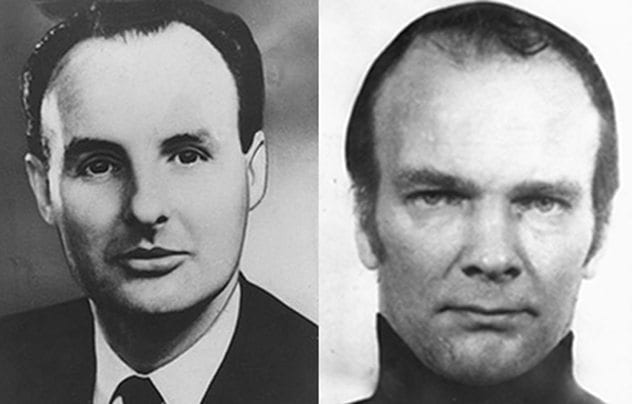
Archibald Hall changed his name to Roy Fontaine as an homage to Joan Fontaine, but he also has a far more memorable title: the Killer Butler. Growing up in a life of crime, Hall made his way into the homes of several wealthy families. He posed as their Butler while stealing valuables from them. His first murder, however, was an old lover and prison-mate who threatened Hall’s position as the butler for Lady Margaret Hudson.
After burying the body, Hall quickly left Lady Hudson’s employment. He then came to work for Dorothy and Walter Scott-Elliot, who owned many antiques that Hall wished to steal. With the help of small-time crook Michael Kitto, they planned the robbery. During their attempt, they were caught in the act by Dorothy Scott-Elliot. This triggered a waterfall of kills, including Dorothy, Walter, and an accomplice named Mary Coggle. Another victim was Hall’s own brother, Donald, who was just released from prison. This final kill ended the spree for Hall and Kitto as police found them with Donald’s body in the trunk of the car. For Archibald Hall, the sentence was life in prison and death did not come until 2002.
3Grace Marks

Grace Marks was a Canadian maid hired in 1843, for a mere $3 a month. She was there for perhaps a month before her story turned from innocent maid to co-conspirator in a double homicide. After learning he was being fired from the position of stable hand, James Mcdermott conspired with Grace. They plotted together to kill their employer and his housekeeper. Mcdermott hit Nancy Montgomery in the head before he strangled her. Thomas Kinnear was shot point blank soon thereafter.
The confessions of the two contradict each other, Grace claiming to be an unwitting accomplice in the murders. Mcdermott, on the other hand, claimed that the murders would not have happened without Grace. He insisted that she pushed at him and taunted him into doing what he did. Whatever the truth between them, both James and Grace were found guilty of the murder of Thomas Kinnear and were sentenced to hanging. However, Grace’s sentence was commuted to life in prison, and in 1873 she was released.
2Eugene Butler

A quiet life on a farm. A small, safe town in North Dakota. What could possibly go wrong? Even after all these years, investigations still cannot tell us what exactly happened on the farm of Eugene Butler in Niagara, North Dakota. Eugene was a reclusive man who slowly sank into madness before being sent to an asylum. There, he often claimed people were coming after him. However, it was not until after he died that the bodies were found.
A workman excavating the basement of the deceased Eugene’s property uncovered six corpses. Each of them stripped of their clothing. Each of them exhibiting signs of a blow to the back of the head. The bodies were never identified, and the mystery remains today as to who the victims were. Though Eugene was only a Butler by last name, one of the theories is that his victims were housekeepers who had become too expensive to pay or farm hands who were plotting to kill him.
1Cicero
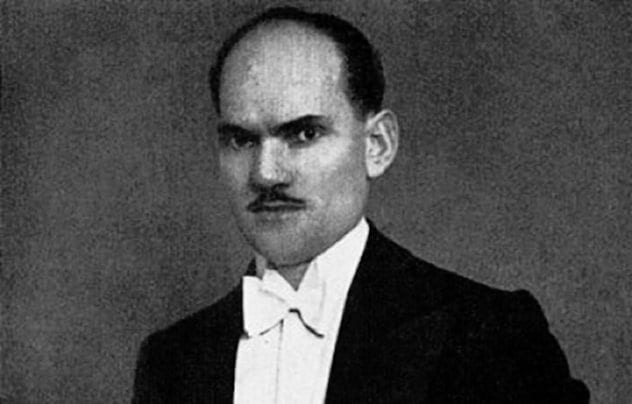
Cicero is the code name of the butler spy who sold secrets to the Nazis during World War II. Cicero, whose real name was Elyesa Bazna, was a valet for the British ambassador to Turkey, Sir Hughe. When Bazna revealed he had fed British intelligence to the enemy, many feared that he had given the Germans documents relating to D-Day. However, sources from declassified CIA documents indicate that the Germans never acted on any of the information that Cicero provided. In fact, much of the money paid to him in trade for the information was counterfeit.
Bazna wrote his story down, in the book I Was Cicero. The book was adapted to a, mostly fictional, movie titled 5 Fingers. When he was last heard from, Bazna was a poor man still living in Ankara, Turkey. This butler did it, certainly, but he did not do it very well.
If you know any other real-life butlers, valets, or maids who have been convicted of a crime, let us know in the comments!
Jessica Betts is a freelance writer and novelist who spends most of her time staring at her keyboard trying to figure out how to use her knowledge of esoterica in both her novels and articles. She can be found through social media under BettsICan, and at her website.








